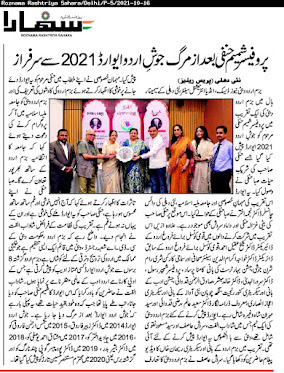کچھ باتیں اکثر یاد آتی ہیں_ جادو تھا سپنا تھا کیا تھا میں نے تجھ میں کیا دیکھا تھا آنکھیں بھی آنکھوں جیسی تھیں ماتھا بھی ماتھے جیسا تھا جس مٹی پر ناز تھا تجھ کو میں بھی اسی مٹی کا بنا تھا ۔۔۔۔۔ علی گڑھ کا آنگن تھا۔ پاپا کی گود تھی۔ جب بچے برادر گرم کی فیری ٹیلز سن رہے ہوتے تھے پاپا ہم کو اور سیمی کو ناصر کاظمی اور اقبال سے روشناس کرا رہے تھے۔ وہاں ایک سٹاف کلب تھا۔ اب بھی ہے۔ شام کو اکثر ہم لوگ جاتے تھے۔ پاپا، شہریار صاحب، ذوقی صاحب، خلیل صاحب، وقار صاحب اور کئی دوستوں سے گفتگو کرتے اور میرا دھیان مینگوآئس کریم میں لگا ہوتا۔ آج بھی وہاں کے یوکلپٹس کے پیڑ اور جگنو یاد آتے ہیں۔ پاپا کا رومال بڑے سائز کا ہوتا تھا تو اس میں جگنو پکڑ کر گھر لے آتے تھے۔ وہ جگنو بہت یاد آتے ہیں۔ شاید پاپا کی الماری میں ان کے رومال اور کپڑے جہاں رکھے ہیں وہاں آج بھی ایک روشنی کا احساس ہوتا ہے۔ 1974ء میں دلـی شفٹ ہو گئے۔ آل انڈیا ریڈیو پر بچوں کے پروگرام میں شرکت کرتے تھے۔ محمود ہاشمی انکل اور پاپا کے ساتھ وہاں کے ماحول سے واقف ہوئے۔ جب بھی دلی میں بک فیئر لگتا تھا تو پاپا ضرور وہاں ہم لوگوں کو لے جاتے تھے۔ Russian Classics اس وقت بہت بورنگ بھی لگتی تھیں لیکن پاپا کافی strictتھے ہماری ریڈنگ لسٹ کے معاملے میں۔ چھپ کے کبھی کبھی Trash literatureبھی پڑھتے تھے لیکن پاپا ہمیشہ گائڈ کرتے رہتے تھے۔ اور کہتے تھے اصلی دولت علم کی ہوتی ہے۔ اچھی کتابیں پڑھو۔ تو وہاں شروع ہوا ہمارا سفر sense سے sensibility تک کا۔ پاپا نے کبھی میز اور کرسی نہیں استعمال کی۔ ایک تخت، گاؤ تکیے اور ان کے ارد گرد پھیلی ہوئی کتابیں۔ وہ تخت آج بھی ان کی موجودگی کا احساس دلاتا ہے۔ انھوں نے کبھی بھی بہت کھل کے اپنے جذبات کا اظہار نہیں کیا۔ بہت سی باتیں ان کی خاموشی ظاہر کر دیتی تھی۔ جب ان کے Plays “مٹی کا بلاوا” اور “مجھے گھر یاد آتا ہے” پڑھے تب لگا کہ ان کے اندر Sense of nostalgia کتنا strong ہے۔ لیکن کبھی کہا نہیں انھوں نے۔ ہماری nascent sensibilities تو یہی کہتی تھیں اُس عمر میں ۔۔۔ کہ ہمارے اماں پاپا صرف ہمارے اماں پاپا ہی ہیں اور کچھ کیسے ہو سکتے ہیں؟؟ لیکن پاپا دوست بھی تھے، بیٹے بھی، بھائی بھی، استاد بھی ۔۔۔ اور بھی کتنے رشتے جو بخوبی انھوں نے نبھائے۔ Loud کبھی نہیں ہوئے۔ Restraint کی صحیح definition پاپا سے سیکھی۔ بس کبھی کبھی سوچتی ہوں _ کچھ اور باتیں کر لیتے ان سے۔
“میں نے چاہا تھا کہ لفظوں میں چھپا لوں خود کو ۔۔۔ خامشی لفظ کی دیوار گرا دیتی ہے۔”

میرا پسندیدہ شعر ہے، پاپا کا لکھا ہوا۔
شاید یہی وجہ ہے کہ بہت سی باتیں اب ان کی یادوں سے کرتی ہوں۔
ایک وقت تھا، شاید 1978ء کی بات ہے۔ ہم لوگ سیدین صاحب کے گھر میں رہتے تھے۔ گھر کا نام تھا “بسیرا”۔ وہ گھر کیا ایک روحانی تجربہ تھا۔ وہاں عینی آپا، بیگم صالحہ عابد حسین، میرن صاحب، انور جمال قدوائی صاحب، رام چندرن نائر صاحب، شاہد علی صاحب وغیرہ سب کا آنا جانا۔ سب سے پہلے اسد الدین صاحب، انیس صاحب اور وحاج صاحب بھی اسی گھر میں آئے تھے۔ ایک اتنی rich tapestry تھی خیالوں کی، باتوں کی، اماں کی دَم والی چائے اور پاپا کی باتیں۔ چائے آج بھی ہے۔ باتیں اب یادیں ہیں۔ پھر کچھ ایسا ہوا تھا کہ اسکول میں اردو بینی کے قابل ہوئے تو پاپا نے ‘پیام تعلیم’ اور ‘کھلونا میگزین’ گھر پہ منگائے اور ہم دونو کو اردو سے روشناس کرایا۔ آج اگر میں کوئی غلطی کروں اردو لکھنے میں تو معذرت چاہوں گی۔ کبھی ایسا پہلے ہوا ہی نہیں کہ کچھ اردو میں لکھوں یا کہوں اور ان سے رائے نہ لوں۔
پچھلے سات آٹھ سالوں میں پاپا کے ساتھ جو وقت گزرا اس میں، میں نے بہت الگ dimensions دیکھے ان کی Personality کے۔ 16th Dec 2014 کو cancer کے لیے پہلی chemo Therapy ہوئی تھی۔ اس کے ایک دن پہلے وہ Rekhta کے فنکشن میں لوگوں سے مخاطب ہو رہے تھے۔ ایسا لگ رہا تھا جیسے لودھی گارڈن واک کرنے جا رہے ہوں۔ cancer کو شکست بہت آسانی سے دی انھوں نے۔ Dr. Bhurrani بھی admire کرتے تھے ان کے جذبے کو۔اکثر پاپا اور میں وارڈ کے corridors میں ٹہلتے تھے۔اکثر پاپا اپنے بچپن کی باتیں بتاتے تھے۔ ان کے ٹیچر قادری صاحب کی، میاں جان (ہمارے دادا) اور ان کی پسندیدہ مٹھائی کی دُکان _ عید و حلوائی کی۔ جو بہت ہی لذیذ موتی چور کے لڈو بناتے تھے۔ کاشانہ سول لائنز،سلطان پور میری آنکھوں کے سامنے جیتا جاگتا ابھر کر آ جاتا ہے۔ میں نے Study Leave لی ہوئی تھی اپنا Thesis لکھنے کے لیے۔ تو ہاسپٹل وارڈ میں میں اپنے laptop پہ ہوتی تھی اور پاپا مجھے guide کرتے رہتے تھے۔ کبھی احساس ہی نہیں ہوا کہ وہاں وہ ایک patient کی حیثیت سے تھے۔ چاہے biopsy ہو یا ان گنت سوئی کے نشان ان کے ہاتھوں میں، کبھی uff تک نہیں کہا پاپا نے۔ Hospital ward No. 4023۔ روشن کمرہ، ایک طرف ایک height chart لگا ہوا تھا۔ weighing scale بھی تھا۔ medical equipments سب set تھے۔ میں ڈاکٹرز اور نرسز سے بات کر رہی تھی۔ جب پاپا کے پاس آئی تو انھوں نے مجھ سے کہا “ذرا وہ height chart دیکھو، یہاں کتنے بچے آئے ہوں گے۔” “جی ہو سکتا ہے یہ children’s ward رہا ہو۔” اور واقعی اسی چارٹ میں ان گنت نشان لگے ہوئے تھے ایسے readingsپہ جو بچوں کی height کے ہوتے ہیں۔ “میری تکلیف کچھ نہیں ہے۔ یہاں جو مجھ سے پہلے آئے انھوں نے ابھی دنیا ہی کہاں دیکھی ہو گی۔ زندگی میں جان ڈالو نہ کہ جان میں زندگی” Bruce Lipton کی Biology of Beliefs میں یہی لکھا ہے کہ جب سوچ positiveہو تو جسم کا ایک ایک cell ٹھیک ہونے کی کوشش میں لگتا ہے۔ پاپا کھڑکی کے باہر کے منظر سے بہت متاثر تھے۔ وہاں peacock’s نظر آتے تھے۔ wilderness میں۔ کبوتر کھڑکی پہ اپنی پُرسکون آواز میں غٹرغوں کرتے تو پاپا کہتے تھے کتنا Serene ماحول ہے۔ زندگی میں ایک موقع ملا ان کے ساتھ stage share کرنے کا۔ Raza Foundation والے VAK Poetry biennially Program Organize کر رہے تھے۔ پاپا کی کتاب “آخری پہر کی دستک” ریختہ نے publish کی تھی۔ مجھے title بہت عجیب سا لگا اور پاپا سے کہا بھی تھا اتنا Negative title کیوں؟ بولے کہ poetry کی جڑیں pathos میں ہوتی ہیں۔ خیر ان کی دس غزلیں Translate کیں۔ کیوں کہ وہاں ہر state سے poets آئے تھے اور انگلش میں Translation ضروری تھا۔ وہ دن میرے دل میں نقش ہو گیا۔ ایک طرف stage پر پاپا ایک طرف میں۔ ایک غزل ان کی share کرنا چاہتی ہوں۔ میرے لیے یہ صرف غزل نہیں ہے، ان کی آواز سنائی دیتی ہے، ان کے جذبات دکھتے ہیں۔ ایسا لگتا ہے مجھ سے کہہ رہے ہیں _ جو اب بھی بہت relevant ہے۔ آج کے حالات دیکھتے ہوئے ۔۔۔۔۔
“بند کر لے کھڑکیاں یوں رات کو باہر نہ دیکھ
ڈوبتی آنکھوں سے اپنے شہر کا منظر نہ دیکھ
میں نے پتھر سہہ لیے لیکن سدا قاتِل ہوئی
خود کو لفظوں سے بچا گرتے ہوئے پتھر نہ دیکھ
ایسا ہنگامہ کہ آوازِ نفس بھی کھو گئی
زندگی کی بات کر یہ عرصہء محشر نہ دیکھ (Day of judgement)
تو نے جو پرچھائیاں چھوڑیں وہ صحرا بن گئیں
اے نگارِ وقت اب پیچھے کبھی مُڑ کر نہ دیکھ
کیا پتا زنجیر میں ڈھل جائے بستر کی شکن
یہ سفر کا وقت ہے اب جانبِ بستر نہ دیکھ
خاک و خوں میراث تیری خاک و خوں تیرا نصیب
اس زیاں خانے میں اپنے پاؤں کا چکر نہ دیکھ
ان کے جانے سے جو خلا پیدا ہوا ہے وہ غیر معمولی ہے اور ہم سب پر اس کا اثر بہت شدید ہے۔

ایک ordinary انسان ordinary family سے کیسے extraordinary dimensions حاصل کر لیتا ہے وہ میں نے پاپا کی شخصیت میں دیکھا۔ اماں کی شفقت میں دیکھا۔ آج اماں ہیں، نیا گھر ہے جس میں ایک مہینے پہلے پاپا، اماں شفٹ ہوئے۔ ان کی شفقت، ان کی محبت، ان کی دوستی سب ہے۔ ان کا احساس ہے ۔۔۔۔ وہ ہمیشہ ہمارے پاس ہے۔
ان کی آخری سانس تک سانس کی تلاش کرنا، ان کا ہاتھ پکڑنا، ambulance میں دلـی کے اسپتالوں کا چکر کاٹنا اور جب بھی میں ان کو ‘پاپا’ کہہ کے مخاطب ہوتی تو وہ eyebrows کا اوپر اٹھانا۔ آج بھی کانوں میں گونجتے ہیں ۔۔۔ ان کے آخری الفاظ ۔۔۔۔ ‘اب چھوڑ دو ، اب جانے دو’۔ بہت سکون سے کہا تھا انھوں نے۔ کوئی عجلت نہیں تھی۔
ان کا احساس ہمیشہ رہے گا۔ ان کی energies ہمارے اطراف رہیں گی۔





















